
States are using fiscal year 2021 Team Nutrition Training Grants to develop new school meal recipes reflecting local foods and cultures. Check out some of the innovative methods states are using to engage students throughout the recipe development process.
Taste-Testing New Recipes
- Curryfornia Bowl a Hit at Wonderful College Prep Academy
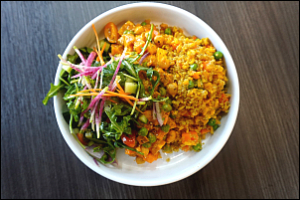
Middle school students at Wonderful College Prep Academy in Delano, California taste-tested a new Curryfornia Bowl recipe. The recipe combines three, plant-based Mediterranean-Indian fusion dishes into one and incorporates local ingredients including brown Basmati rice, butternut squash, olive oil, and quinoa. Students rated this recipe “I loved it,” “I liked it,” or “I didn’t like it.” Ninety-two percent of the students who sampled the recipe either liked or loved it. This recipe will be standardized and added to school lunch menus.
- Romoland School District Teams Up with Local Farm
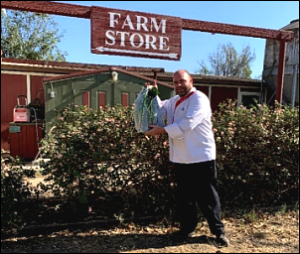
Romoland School District’s (RSD) food service team in California visited Amy’s Farm where they sourced turnips, rutabagas, parsnips and carrots to prepare their Roasty Toasty Root Vegetable recipe. The food service team worked with the farm to see which root vegetables were in season and selected the vegetables for the recipe based on availability.
The recipe was taste-tested by students at Harvest Valley School and achieved an 88 percent approval rating. RSD’s Chef Toby also created a video demonstrating how to make the recipe for students and community members to show that it’s easy to enjoy roasted vegetables at home.
- Georgia Adapts Taste-Testing Methods for High School Students
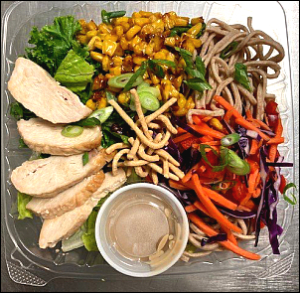
The Georgia Department of Education adapted their taste-testing process for a high school audience. Students at Creekview High School taste-tested a new recipe for Citrus Ginger Noodle Salad and submitted feedback for the recipe utilizing a QR code posted at the point of sale. Students were able to use their smartphones to complete the survey, which allowed for a contactless survey process and quick response times.
The recipe, which features Georgia-grown mustard greens, achieved an 86 percent student acceptability rating during the taste test and will be standardized for school meal menus.
- Bellingham Culinary Arts Students Vital in Recipe Development

The Bellingham Public School District in Washington is developing five new standardized recipes as part of the Fiscal Year 2021 Cohort A Team Nutrition Training Grant. They conducted a taste test with 60 Bellingham High School culinary arts students, who sampled beet hummus, chickpea masala, cauliflower alfredo, veggie queso fundido, and tortilla soup. Many of these recipes are plant-based and reflect cultural food preferences of the students.
Recipes were adjusted to improve their nutrient content and all five recipes achieved at least a 93 percent acceptability score after these revisions.
- Pennsylvania North Hills School District Holds a Recipe Contest

North Hills School District in Pittsburgh, Pennsylvania hosted a “Chopped”-style recipe contest to help develop standardized recipes for school meals incorporating locally grown cabbage. Two classes of Family and Consumer Science students taste-tested the top four recipes and submitted their feedback through Google forms. The winning recipe was Chicken Chow Mein with cabbage, green onions and a soy/sesame sauce. The Family and Consumer Science students will use what they learned to assist in the next round of taste testing with elementary school students.
- Louisiana’s Festival of Flavors Spices Things Up in Richland Parish Schools

After attending the Louisiana Department of Education’s (LDOE) “Festival of Flavors” training, Richland Parish Schools incorporated locally grown tomatoes into two new recipes: Taco Salad and Fresh Garden Salsa. To ensure these recipes were student-approved, Richland Parish engaged both students and staff in taste testing the new recipes. During a taste-testing event, more than 50 students tried both recipes, with 90% of students rating each recipe as “good.” Students spoke highly of the salad’s freshness and crisp texture and recommended the salsa be served warm or hot. LDOE plans to develop other versions of these recipes with more spice. According to one student, “We want it spicier. We are from the South, and we like things spicy here!”
Local and Cultural Foods
- Bison and Barley Soup
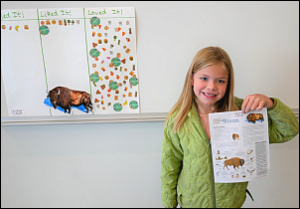
Montana’s Belgrade School District is teaching Story Creek Elementary School students about local bison as part of the Montana Harvest of the Month program. Students participated in a taste test of Montana Bison and Barley Soup and gave ratings of “Tried It,” “Liked It,” or “Loved It.” Almost 90 percent of students liked or loved the soup.
- Purple Pirate Potatoes

Students from the Philipsburg School District, in Montana, enjoyed a delicious “Taste of Montana” meal for school lunch, which included bison, barley, beets, apples, carrots, cabbage, onions, and potatoes. Students learned about these Montana foods and taste-tested a new recipe for Purple Pirate Potatoes (a delicious combination of roasted beets and sweet potatoes). The recipe had a 90 percent approval rating.
- Soul Food

Chefs Weezy and Gwen Barnes of Lott and Big Weezy’s Kitchen, a restaurant in Michigan, presented on the history and preparation of soul food to the high school culinary students at Muskegon’s Career Tech Center. The chefs provided the students with a lunch including smokey rib tips, collard greens, yams, and catfish. They also walked the students through the preparation of each dish including the key ingredients, main spices, and cooking methods along with a brief history of soul food. The catfish was a student favorite! The students will be working with the chefs on the development of a standardized recipe for school lunch that highlights African American cuisine.
- Bison Pizza
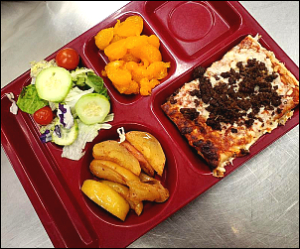
The Nebraska Department of Education (NDE) created the Local/Indigenous Foods Training (LIFT) project, which focused on testing, evaluating, and standardizing recipes that used local agricultural and Indigenous foods. Recipes included Bison Pizza Topping, Aronia Apple Crumble Bars, and Strawberry Rhubarb Topping. Fifteen (15) schools participated, including Cedar Bluffs Public Schools, where students were able to sample bison from a local butcher shop, and learned the benefits of eating foods that are local and indigenous to Nebraska. 98% of students that tried the Bison Pizza topping liked or loved it.
- Mushroom Queso

The Texas Department of Agriculture (TDA) developed, prepared, and taste-tested three recipes featuring local agricultural products at the Florence Independent School District, including Mushroom Queso. Chef Corrie Clark from the Culinary Institute of America San Antonio delivered training to 13 Child Nutrition Professionals and provided guidance on preparing the recipes. TDA provided nutrition education on the three featured local agricultural products: mushrooms, beef, and brown rice. The taste tests were a success. Students suggested to add more seasoning, make the consistency thinner, and to chop the mushrooms finer. The acceptance rate for the mushroom queso was 85.7%.
- Maple Butternut Squash

The Wisconsin Department of Public Instruction, through the help of their annual “Whipping Up Wellness” Wisconsin Student Chef Competition, focused on testing, evaluating, and standardizing recipes that used local agricultural and Indigenous foods. Five schools participated, and students were able to sample local butternut squash. They had the opportunity to learn about its importance to Wisconsin agriculture, and 91% of students who tried the Maple Butternut Squash liked or loved it.
Tips for Cultural Diversity in School Meals
- Plan and Prepare Cultural Cuisines

Minnesota Department of Education - Involve school nutrition staff when identifying new menu items. They can provide input on the feasibility of preparation, which can give them a sense of pride in the new items.
- Connect with community partners to learn about culinary techniques of diverse dishes.
- Use traditional preparation techniques, ingredients, spices, and product sourcing as much as possible.
- Incorporate traditional Indigenous foods like bison, mesquite flour, wild rice, and ancient varieties of squash and corn into school meals.
- Promote Cultural Cuisines
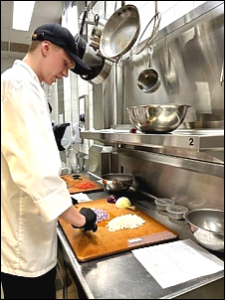
Wisconsin Department of Public Instruction Whipping Up Wellness Student Competition. - Engage students throughout the recipe development and testing process to ensure acceptability and assist with promotion of the recipe.
- Celebrate cultural heritage months with new foods in the cafeteria and highlight the nutritional benefits and cultural significance.
- Share information with families on the new menu offerings including photos and recipes.
- Honor Cultural Traditions

- St. Paul Public Schools in Minnesota is a recipient of the Healthy Meals Incentives Recognition Award - Innovation in the Cultural Diversity of School Meals.
- With an increasing number of students who speak an East African language, St. Paul Public Schools wanted to honor culinary traditions by adding new menu offerings. They collaborated with a chef who helped them develop Hamari Chicken. The preparation process includes roasting whole spices and grinding them into a spice rub that creates a complex flavor. The Hamari Chicken is served with Yellow Rice, a dish seasoned with turmeric, onion, and garlic powder, providing a new frontier for student palates.
More Information
- Child Nutrition Recipe Box - A collection of standardized recipes developed by Team Nutrition and Team Nutrition Training Grant grantees, more coming soon!
- Culturally Inclusive Foods Offered in FNS Programs - Resources and training about culturally inclusive foods offered in nutrition assistance programs.
- Institute of Child Nutrition’s Culturally Inclusive Recipes Toolkit- Resources and information for school nutrition operators and the school community to collaborate on the process of identifying, developing, and incorporating culturally inclusive recipes into school meals programs.
- MyPlate’s Cultural Foods Photo Gallery – A collection of images from MyPlate inspired meals representing African, Asian and Pacific Islander, Haitian and Jamaican, Latin American and Hispanic, Mediterranean, Middle Eastern, Native American and Alaskan Native, and Southern cuisines. Download and use for nutrition education materials and communications with families.
Share your school meal program menus and recipes with us at TeamNutrition@USDA.gov. Your menus and recipes may be featured in future Team Nutrition publications and resources.

